What Makes a Cake Truly Organic?
A truly organic cake comprises at least 95% certified organic ingredients, ensuring it is free from synthetic pesticides and GMOs. It's important to source ingredients responsibly, preferably from local suppliers, to support sustainability and freshness. Using natural preservatives, such as vinegar or citric acid, is crucial for maintaining quality. Understanding these aspects is essential for appreciating organic baking and its standards.
Key Takeaways
A cake is considered truly organic when at least 95% of its ingredients are certified organic, excluding water and salt. This means no synthetic pesticides or genetically modified organisms, resulting in lower chemical residues.
Sourcing ingredients locally not only boosts freshness but also supports sustainability, which is a key principle of organic practices. For shelf life, natural preservatives like organic acids and fruit concentrates are preferred over synthetic additives.
To maintain organic integrity, it's crucial to comply with strict labelling regulations and certification processes.
Understanding Organic Ingredients
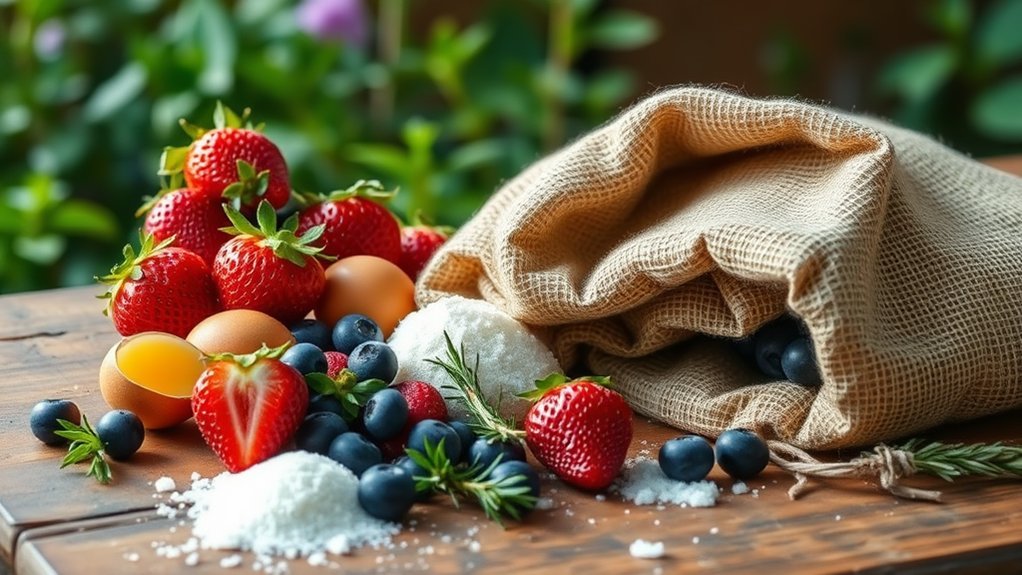
Understanding organic ingredients is crucial for anyone wanting to bake an authentic organic cake. Organic baking involves using food products from plant or animal sources that adhere to strict organic standards. These standards ban synthetic pesticides and genetically modified organisms, fostering a healthier environment. While organic ingredients aren't always more nutritious, they typically have lower pesticide residues, which is appealing to health-conscious consumers. Common organic ingredients include grains, dairy, and natural sweeteners, all essential for the quality of your cake. By choosing these ingredients, you not only enhance the cake's flavour but also support sustainable practices that benefit the environment. Ultimately, grasping these elements is vital for creating a genuinely organic cake. Additionally, knowing that organic ingredients must meet USDA organic standards ensures the integrity of your baking choices.
Certification Requirements for Organic Cakes

Labelling a cake as organic may seem simple, but there are strict certification requirements to comply with UK standards.
To achieve organic cake certification, you need to ensure that:
- At least 95% of your ingredients are organic, excluding water and salt.
- All organic ingredients are thoroughly verified for their organic status.
- You maintain detailed records of your production practices and how you source your ingredients.
- You follow labelling regulations that clearly identify organic ingredients and the certifying body.
Not adhering to these standards can result in fines and damage to your reputation. Additionally, the global organic bakery market is valued at $8.7 billion, highlighting the importance of meeting these requirements to capture consumer interest.
It's essential to understand these requirements if you want to produce genuine organic cakes that meet customer expectations and regulatory standards.
The Importance of Ingredient Sourcing
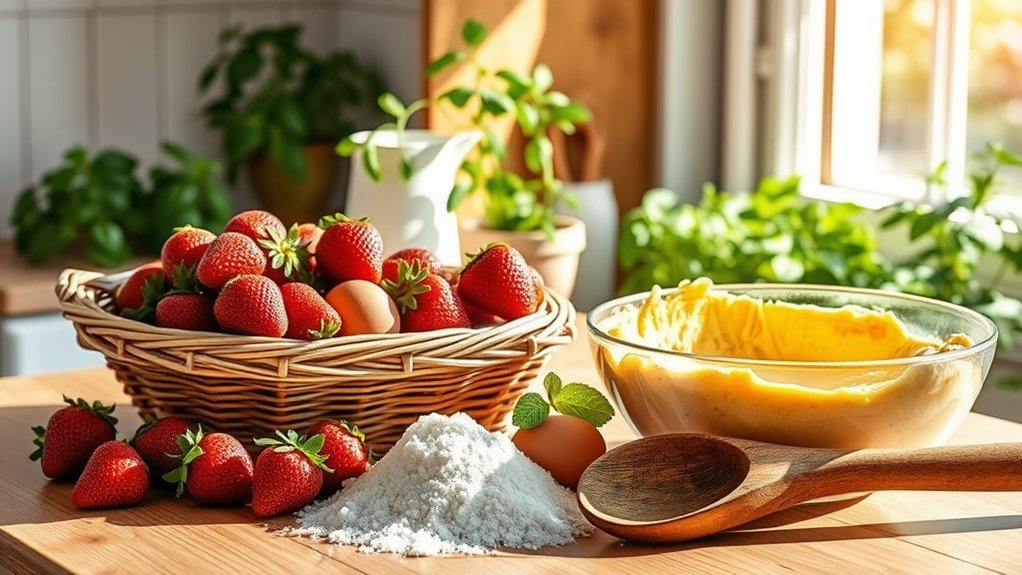
To achieve organic certification, the quality of your ingredients is crucial for creating authentic and appealing cakes. Sourcing locally not only cuts down on your carbon footprint but also boosts the freshness and flavour of your bakes. By partnering with local suppliers, you support community growth and bolster local economies, all while ensuring your ingredients are non-GMO and free from synthetic chemicals. Using seasonal produce enhances the taste and texture of your cakes, promotes biodiversity, and conserves water. It's vital to maintain transparency in your supply chain. Additionally, using organic whipping cream instead of traditional buttercream contributes to a healthier taste profile. In short, prioritising ingredient sourcing is key to making cakes that are genuinely organic and aligned with sustainable practices.
The Role of Preservatives in Organic Baking

In the world of organic baking, preservatives are vital for ensuring the quality and safety of your baked goods. By using natural preservation methods, you can effectively prevent spoilage and extend shelf life.
Here are some key points to consider:
- Organic acids such as lactic and citric acids lower the pH, enhancing flavour and inhibiting spoilage.
- Vinegar and essential oils possess antimicrobial properties, providing a healthier option for consumers who prefer cleaner labels.
- Fruit concentrates are rich in natural acids, which help to maintain freshness.
- Lactic acid bacteria produce substances that fight off spoilage organisms.
These natural alternatives not only help keep your baking safe and delicious but also appeal to the growing number of health-conscious consumers.
Compliance With USDA Organic Standards
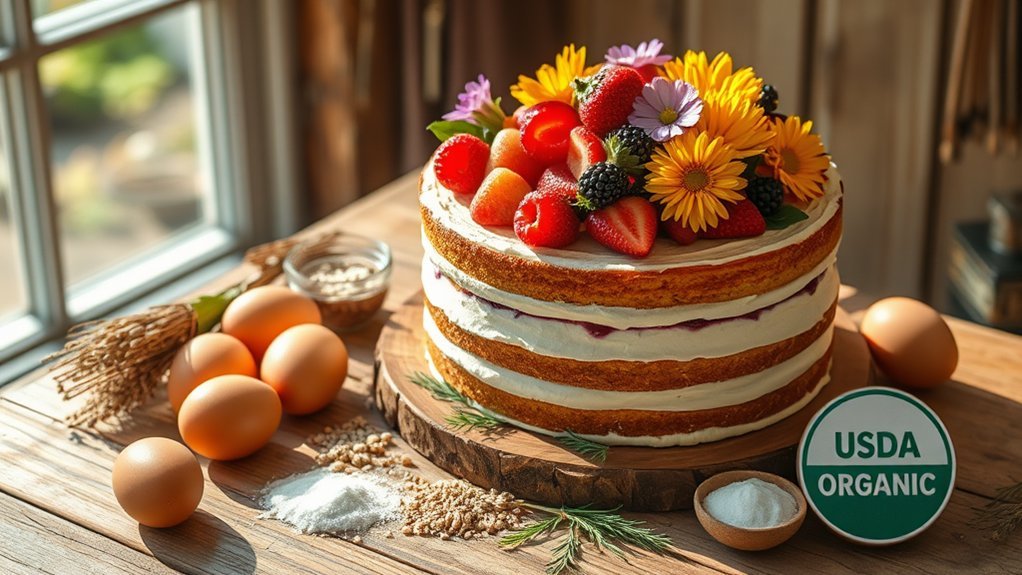
To create a genuinely organic cake, it's essential to grasp the strict compliance requirements set by the USDA.
Certification requires a detailed Organic Systems Plan along with thorough inspections to ensure that ingredient sourcing meets specific organic standards.
Many producers, however, struggle to maintain compliance while navigating the complexities of organic labelling and ingredient traceability.
For instance, sourcing ingredients like organic flour or free-range eggs can be straightforward, but ensuring they're certified organic can be a challenge.
Certification Requirements Explained
Navigating the complexities of organic certification requires a clear understanding of the compliance requirements set by the USDA. Here are the main steps to achieve certification while ensuring transparency and adherence to organic labelling standards:
- An initial inspection by a USDA-accredited certifying agent is essential.
- Annual inspections are necessary to maintain compliance with USDA regulations.
- You must develop and maintain an organic system plan that meets these requirements.
- Keeping detailed records is crucial to demonstrate compliance with USDA organic standards.
Additionally, products mustn't use prohibited methods and must comply with the National List of Allowed and Prohibited Substances.
It's also important to use approved labels to accurately reflect your product's organic status.
Ingredient Sourcing Standards
How do you ensure that your cake ingredients meet UK organic standards? Start by confirming that your organic ingredients comply with the strict requirement of at least 95% organic content. You may include up to 5% of non-organic ingredients, but they must be on the approved list. Always check that your suppliers are certified organic and can provide the necessary documentation for each ingredient.
| Criteria | Details |
|---|---|
| Organic Ingredients % | Minimum of 95% organic required |
| Non-Organic Allowance | Up to 5% allowed from approved list |
| Certification | Suppliers must hold valid organic certificates |
Compliance Challenges Faced
Despite the USDA organic certification process aiming to ensure compliance with rigorous standards, many producers face considerable challenges in upholding organic integrity.
Here are some key issues you may encounter:
- Regulatory Oversight: As the organic food industry expands rapidly, the USDA struggles to effectively monitor over 25,000 operations.
- Inadequate Inspections: Some certifying agents don't carry out the comprehensive onsite inspections required by regulations.
- Administrative Burden: Producers often find themselves overwhelmed by paperwork rather than addressing genuine compliance violations.
- New Regulations: Recent updates are intended to close loopholes, which means businesses must quickly adjust to stay compliant.
Given these mounting challenges, taking proactive steps is crucial to ensure your products are genuinely organic.
Challenges in Obtaining Organic Certification

Obtaining organic certification can be a daunting task for many. The process is often complicated and can come with significant costs.
You'll need to create detailed organic system plans and undergo regular inspections, all while meeting strict UK standards. For anyone looking to gain and maintain organic status for their products, it's crucial to understand these challenges.
For example, a farmer might spend weeks preparing for inspections to ensure compliance, which can be both time-consuming and stressful.
Certification Process Complexity
Navigating the complexities of the organic certification process is a significant challenge for farmers, especially with strict regulatory standards set by the USDA and other organisations.
These barriers can create major obstacles. Key factors include:
- Regulatory Compliance: The stringent standards can be daunting for many farmers.
- Inspection Difficulties: Certifying agents may face challenges in conducting thorough onsite inspections.
- Ongoing Oversight: Insufficient oversight can result in the mixing of organic and conventional produce.
- Marketplace Misrepresentation: Some farmers may label their products as organic without proper certification.
These regulatory challenges can deter aspiring organic farmers, particularly small and BIPOC farmers, who often lack the resources and support to navigate this complicated process effectively.
Costly Compliance Requirements
Navigating the complexities of organic certification can be daunting, especially when considering the financial implications for farmers. Compliance costs, including certification fees, can vary significantly—from a few hundred to several thousand pounds each year, depending on the size of your operation and the certifying body you choose.
Converting land to organic production can be particularly expensive due to a three-year period during which prohibited substances can't be used. Ongoing costs for monitoring and record-keeping further add to the financial strain.
While government programmes may reimburse eligible operations for up to 75% of certification costs, the strict labelling requirements and the need for meticulous documentation can still stretch resources thin. Understanding these costs is crucial for successfully achieving and maintaining organic certification.
The Certification Process Explained
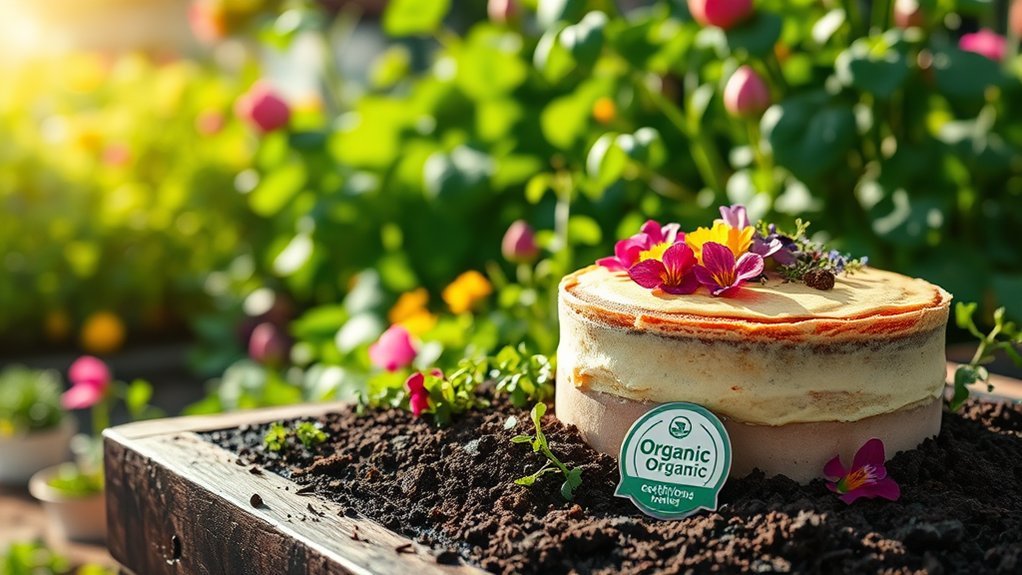
The path to organic certification is a detailed process aimed at ensuring products meet strict standards.
Here's a straightforward guide to the essential steps involved:
- Initial Application: Begin by submitting a comprehensive application to the relevant certification body.
- Document Requirements: Create an Organic System Plan (OSP) that outlines your operations, compliance strategies, and record-keeping practices.
- Inspector Involvement: Certification bodies will arrange for inspectors to conduct on-site evaluations of your operations.
- Certification Decision: After the inspection, a decision will be made on whether you meet the certification criteria.
To maintain organic integrity, it's crucial to comply with UK standards, manage prohibited substances, and ensure traceability throughout your production process.
This thorough approach not only demonstrates your commitment to organic farming but also improves market access and builds consumer trust.
The Impact of Regional Variations on Organic Labeling

When you look at organic labelling, you'll notice considerable differences in certification requirements across regions.
For example, in the UK, products can be labelled as organic after a three-year transition from using prohibited substances, while the EU demands stricter ecological practices.
These discrepancies can pose compliance challenges for producers aiming to enter international markets and meet varying consumer expectations.
Certification Requirements Differences
Understanding the differences in certification requirements for organic products is crucial, particularly as regional variations can significantly affect labelling practices.
Many people mistakenly believe that all organic products adhere to the same standards. Here are some key points to consider:
- To be labelled as "organic," products must contain at least 95% organic ingredients.
- Certification is necessary for most producers and handlers, although there are some exemptions.
- Labels must clearly indicate the certifying agent and specify which ingredients are organic.
- Different countries have distinct labelling standards, which can influence consumer trust.
For example, while a product may be labelled organic in one country, it mightn't meet the same criteria elsewhere.
Regional Compliance Challenges
Navigating the complexities of organic labelling can be a daunting task for bakeries, particularly given the regional compliance challenges posed by differing regulations.
These variations in organic standards often require bakeries to implement multiple compliance strategies, which can lead to increased costs and logistical difficulties. For instance, sourcing certified organic ingredients can be tricky in certain areas, affecting the consistency of your products.
Moreover, labelling standards can vary significantly, influencing how you present your goods to customers. Small bakeries, in particular, may feel the strain of extensive record-keeping requirements.
Additionally, trade regulations can limit market access, complicating efforts to expand into new regions. Understanding these challenges is crucial for maintaining consumer trust and successfully managing your organic bakery.
Consumer Demand for Organic Products

As awareness of health and environmental issues increases, the demand for organic products has risen sharply.
If you're part of the 76% of adults motivated by health benefits, you likely choose organic foods for their perceived nutritional value.
Here are the main factors driving this trend:
- Health Awareness: Many see organic products as healthier choices.
- Environmental Impact: Consumers are concerned about the negative effects of conventional farming.
- Younger Generations: Millennials and Gen Z are more focused on sustainability and ethics in their food choices.
- Clear Labelling: Transparency regarding organic certifications is becoming increasingly important.
These factors indicate a significant shift towards organic consumption, highlighting a collective desire for clean and ethical food.
This trend is set to influence the future of the food market in the UK.
The Growth of the Organic Bakery Market

The organic bakery market is witnessing notable growth, spurred by a rising consumer demand for organic products that's transforming the wider food industry.
It's expected to increase from £12.14 billion in 2024 to £15.01 billion by 2029, with a steady compound annual growth rate (CAGR) of 4.2%.
Sustainable practices are crucial as consumers place greater importance on health and environmental issues.
Key players such as Mondelez International and Grupo Bimbo are fiercely competing in this space, constantly innovating to provide clean-label options and plant-based ingredients to meet consumer expectations.
The Asia-Pacific region shows the most growth potential, while North America remains a strong market, particularly for organic bread.
Advances in e-commerce are also boosting product visibility and accessibility, contributing to this upward trend.
Maintaining Transparency in the Supply Chain
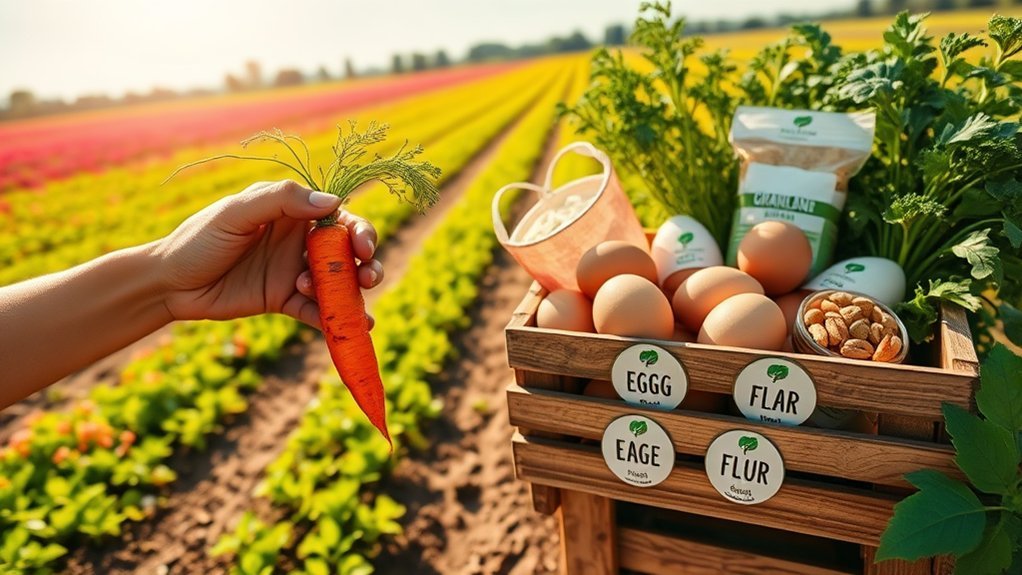
Maintaining transparency in the supply chain is crucial for organic products, but it comes with challenges that brands need to overcome to earn consumer trust.
Here are some straightforward steps to achieve transparency:
- Clearly define your brand's transparency goals and communicate them effectively.
- Work with suppliers who prioritise ethical sourcing and sustainability.
- Use technology, such as QR codes, to provide consumers with detailed product information.
- Regularly monitor and audit your supply chain to guard against fraud.
Frequently Asked Questions
Can I Make a Cake at Home Using Organic Ingredients?
Yes, you can definitely make a cake at home using organic ingredients. By choosing organic flours, sweeteners, and dairy, you not only ensure a healthier bake but also enhance the flavour and texture. This makes your cake both tasty and wholesome.
What Are the Health Benefits of Eating Organic Cakes?
Imagine enjoying a moist slice of cake, sweetened with natural ingredients. Organic cakes often contain more fibre, antioxidants, and healthier fats compared to their non-organic counterparts. This means you can indulge in a tasty treat while also supporting your health, making each bite a guilt-free pleasure.
How Can I Identify Truly Organic Cakes in Stores?
To spot genuinely organic cakes in shops, look for certification labels that confirm the product meets UK organic standards. Ensure the cake contains at least 95% organic ingredients and steer clear of artificial additives. For instance, if you see a cake labelled as 'organic' but with a long list of unrecognisable ingredients, it's best to avoid it. Always check the packaging to ensure you're buying something authentic.
Are Organic Cakes More Expensive Than Conventional Cakes?
Organic cakes are generally more expensive than conventional ones. This price difference stems from sourcing higher-quality ingredients, such as whole grains and healthier fats, which tend to cost more. Consumers often see organic cakes as a worthwhile investment in better quality.
What Flavors Are Typically Found in Organic Cakes?
When it comes to organic cakes, you'll commonly find rich chocolate, classic vanilla, and fresh berry compotes. These flavours come from high-quality organic ingredients, offering a delightful taste while catering to those who prefer natural and wholesome options.
Conclusion
As you enjoy that organic cake, remember it's more than just flour and sugar; it involves a maze of regulations, local practices, and consumer preferences. You might think you're indulging without guilt, but navigating the organic certification process can feel like solving a tricky puzzle. The irony? While you relish each bite, the cake's path to your plate is often as tangled as trying to stick to a New Year's resolution for healthier eating. Enjoy the contradiction!







